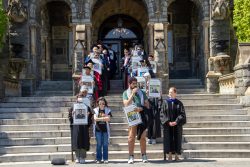On Nov. 26, the Voice’s Gavin Bade sat down with Kaya Henderson (SFS ‘92), interim chancellor of District of Columbia Public Schools, to talk education reform in D.C.
The policies of your predecessor, Michelle Rhee, were relatively controversial nationwide. Do you intend to change any of them?
I’ve been Michelle [Rhee’s] deputy for the past three-and-a-half years, so they are not her policies. They are our policies. I ran our human capital shop and everything that had to do with people, including hiring, firing, professionally developing, retaining, evaluating, compensating. The [Washington Teachers Union] contract that we negotiated, I was the lead negotiator on. … I don’t see us turning around anything.
How do you answer critics of your merit pay system who say too many teachers are being fired?
What people really need to understand is our theory of action … to ensure that every single classroom has the most highly effective teacher possible. … It means we have to reward and retain our highest performers, to support and develop our middle performers, and it means we have to move out our lowest performers. … Part of the issue was whether or not we even knew who our highest and lowest performers were, and we didn’t when we got here. So, we created a teacher evaluation tool [called IMPACT].
Instead of relying on a single observation by a principal or assistant principal on a laundry list of random competencies, which is how a lot of evaluation systems work, [IMPACT] allows for five observations against a teaching and learning framework which capture the practices of great teachers. … We believe very strongly that you can’t say that someone is a highly effective teacher unless their student achievement results support that. … That means test scores, that means end of term exams. That means all kinds of measures of growth.
How do you answer critics who say that measuring a student’s test scores doesn’t always accurately reflect a teacher’s impact in the classroom?
We don’t believe in basing a teacher’s pay only on test scores, but we do believe it is an important component when we measure a teacher’s effectiveness. … Nobody in the country has an evaluation system that is as sophisticated, that is as fair … and provides teachers multiple opportunities to show their stuff. When you change from a very simple system to a very complex system, there’s bound to be a lot of rumblings. … Our teachers are saying that they’ve never gotten this kind of specific feedback on their classroom instruction as they have with IMPACT.
The second thing is that IMPACT is allowing us to make decisions in completely different ways. … It has identified who our highest performing teachers are … it helps us spend our money differently. So, we spend millions of dollars on professional development. Previously it’s been random, with no idea as to what return on investment looks like. Now we can be proscriptive on what kind of professional development [the teacher needs].
How do you see your relationship with the unions at this point?
I’ve been our main labor negotiator … and enjoy a really good relationship with all of our unions. Up until I got this job, [I] was meeting with them monthly. … Union-district fights sell newspapers. What nobody wants to talk about is that at my 40th birthday party in July, my union friends were there because I spend just as much time with them as I do with my co-workers.
I think the unions are in a particularly difficult place right now. They are trying to move from being organizations that were only concerned about wages and job protection and job security to a changing environment, where as professional organizations, they are called upon to be partners and leaders in school reform. … I think they are trying to figure out how to go from where they were to where they need to be.
What’s the biggest current challenge to the school system?
We are engaged in a massive culture change … and culture change is like rerouting the Titanic. You can’t just turn a corner. The teacher is the lynchpin in that, but it’s [also] professional development, it’s curriculum … it’s change that has to happen in the classroom. … So keeping the culture change going and really pushing down to the point where the unit of change is the classroom is the biggest challenge.




